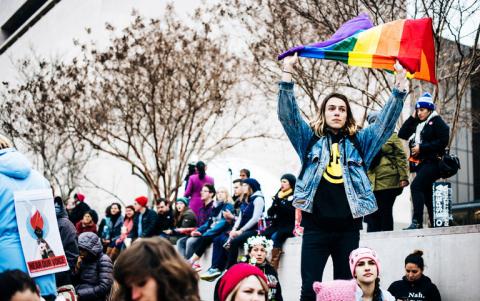In my roughly 20 years working in the federal policy arena, few things have become clearer to me than the importance of data. If something is not counted, it is neither seen nor understood. For all intents and purposes, it does not exist.
That’s why the Trump administration’s decision not to collect data on the lives of lesbian, gay, bisexual and transgender Americans threatens these communities in ways that are both symbolic and practical.
It was announced Tuesday that the United States Census Bureau director, John H. Thompson, had abruptly stepped down from his job, drawing national attention to the agency. But I and others in the L.G.B.T. community have been focused on the bureau’s work for months — for reasons related not to its leadership, but to the collection of information. In March, when it published a list of planned subjects for data collection that included a proposed question on these topics, many of us were optimistic. After years of advocating this very change, there was a possibility that we might be more fully counted. But that cheer was to be short lived. The Census Bureau quickly clarified that it had “inadvertently listed sexual orientation and gender identity as a proposed topic” and made changes to the online document within hours.
During the same month, the Department of Health and Human Services eliminated questions about L.G.B.T. people from drafts of two critical surveys: the National Survey of Older Americans Act Participants, which helps inform social and nutritional support programs for seniors; and the Centers for Independent Living Annual Program Performance Report, which helps inform programs designed to allow people with disabilities to live independently.
This is concerning, because sound policy relies on good data, which in turn relies on robust data collection. The federal government needs to understand the American public if it is to devise policy that directly affects it. Such understanding is impossible without data collection.
That’s why the U.C.L.A. School of Law’s Williams Institute think tank and SAGE, an organization dedicated to improving the lives of lesbian, gay, bisexual and transgender older adults, have called for better data on older L.G.B.T. people.
Given the discrimination, social isolation, health disparities and economic fragility that L.G.B.T. populations as a whole face, this need is especially urgent. The data collection rollbacks don’t just prophesy bad policy. They recall a time of deep discrimination and pain that we have spent decades trying to reverse.
Harvey Milk, the first openly gay elected official in a major American city, famously urged gay Americans in 1978 to come out to their relatives, neighbors, friends and co-workers to “break down the myths” and “destroy the lies and distortions” about this community.
The national coming-out movement was premised in part on the notion that if L.G.B.T. Americans went from a “them” to an “us” — people’s own brothers, sisters, mothers, fathers, aunts, uncles, neighbors and colleagues — it would reduce callousness and undercut the ability to deny them rights. When people came out, it made it harder for others to cling to the belief that they did not have L.G.B.T. people in their families, or that no L.G.B.T. people lived in their neighborhoods, attended services at their houses of worship or worked alongside them.
Failing to collect good data on sexual orientation and gender identity allows policy makers and elected officials to hold the utterly false belief that no L.G.B.T. people use their services and that no L.G.B.T. people live in their electoral districts. It robs policy makers of the ability to understand us and it makes evidence-based policy more difficult. It puts L.G.B.T. Americans as a group back into the closet.
Without collecting data on sexual orientation or gender identity, we don’t know the size of the L.G.B.T. population or how that population is geographically distributed. We aren’t able to learn about how many L.G.B.T. individuals have children, or whether that differs in urban versus rural areas. We have no official information about the component groups that make up the L.G.B.T. community and no insight into their income or housing status — topics that are especially salient for transgender people. And we can’t possibly know how sexual orientation or gender identity combines with other identities (such as race) and whether that correlates to differences in employment, housing or geographic location.
This information affects the way the federal government designs and delivers services to the American people. Without the data formerly collected through the Survey of Older Americans Act Participants, for instance, H.H.S. can’t meaningfully assess whether L.G.B.T. individuals have greater difficulty getting access to programs that provide transportation, caregiver support or home-delivered meals.
The canceled census data collection also represents missed opportunities for improving the lives of L.G.B.T. Americans and their families. For example, without data to guide the effort, how can program administrators ensure that information on the Summer Food Service Program — which allows low-income children to have access to nutritious meals when school is out of session — reaches L.G.B.T. parents in places where they live, in media they consume and in language that includes them? Without this information, children could be more likely to go hungry.
Policy implications aside, the news also stings for personal reasons. The census is a snapshot of the American family. The administration’s recent decisions cut L.G.B.T. individuals out of the family portrait, calling into question our membership in the family. Many of us know that feeling all too well.
Praveen Fernandes is a lawyer and principal at the Raben Group. He served as senior counsel and adviser to the general counsel at the United States Office of Personnel Management under President Barack Obama.


Spread the word